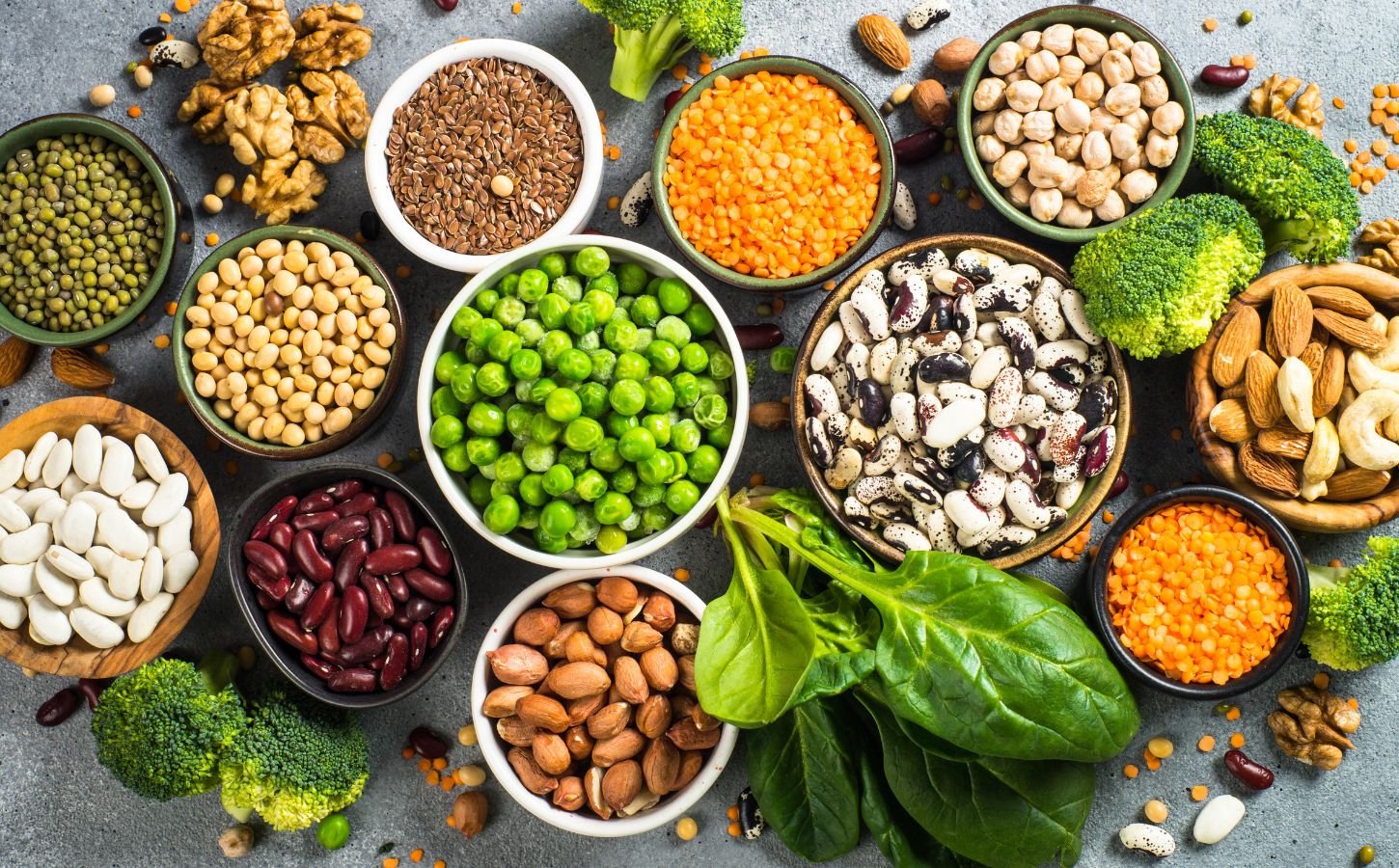How to Transform Family Dinners Using Plant Based Beef Without Sacrificing Flavor
How to Transform Family Dinners Using Plant Based Beef Without Sacrificing Flavor
Blog Article
All About Healthy And Balanced Food: Benefits of Taking On Plant Based Options
The discussion surrounding plant-based diets has acquired significant attention in recent years. Numerous individuals are checking out the possible wellness advantages, dietary benefits, and environmental effects linked with these nutritional options. As people come to be extra familiar with their food's impact on wellness and sustainability, questions occur about the practicalities of taking on such a way of living. What particular changes can one expect, and just how might these options improve not only individual health however likewise the world's future?
Comprehending Plant-Based Diets
Although many individuals associate plant-based diet regimens primarily with vegetarianism or veganism, these diets can include a wide variety of consuming patterns that prioritize whole, minimally refined plant foods. Such diet plans frequently consist of fruits, vegetables, entire grains, seeds, vegetables, and nuts, while eliminating or restricting pet products. This adaptability allows people to customize their dietary selections according to dietary demands and personal choices. Some might embrace a largely plant-based diet while still sometimes consuming meat or dairy, typically described as a flexitarian method. The emphasis continues to be on incorporating more plant foods, which can cause a varied range of dishes and tastes. Understanding these different analyses of plant-based consuming is important for appreciating its access and appeal in contemporary food culture.
Wellness Conveniences of Plant-Based Foods
The health benefits of plant-based foods are considerable, supplying a nutrient thickness benefit that supports total wellness. Study shows that these foods can improve heart health and play a crucial duty in effective weight management. By integrating a lot more plant-based alternatives, people might boost their nutritional selections and advertise lasting wellness.
Nutrient Thickness Benefit
Nutrient thickness plays a crucial duty in the wellness advantages of plant-based foods, making them an engaging option for those looking for a balanced diet plan. Plant-based foods, such as fruits, vegetables, legumes, nuts, and whole grains, are frequently rich in important vitamins, minerals, and antioxidants while being reduced in calories. This high nutrient thickness permits people to take in fewer calories while still meeting their nutritional demands. In addition, these foods are loaded with dietary fiber, promoting digestive wellness and assisting in weight monitoring. By including nutrient-dense plant-based options, consumers can improve their overall health, sustain their body immune systems, and decrease the risk of persistent illness. Eventually, the nutrient density of plant-based foods emphasizes their value in a health-conscious way of life.
Heart Health Improvement

Weight Monitoring Assistance
Along with advertising heart health and wellness, a plant-based diet can substantially help in weight management. This nutritional method stresses whole foods such as fruits, veggies, vegetables, nuts, and whole grains, which are usually lower in calories and greater in fiber compared to animal-based items. The high fiber content aids enhance satiation, decreasing total calorie intake. In addition, plant-based diets are usually rich in necessary nutrients while low in unhealthy fats, making it less complicated to maintain a healthy and balanced weight. BBQ Sauces. Research suggests that people that embrace a plant-based way of living tend to have lower body mass indexes (BMIs) and experience even more effective weight reduction contrasted to those that eat meat-heavy diets. Welcoming plant-based options is a tactical option for efficient weight monitoring.
Nutritional Worth of Plant-Based Ingredients
Plant-based ingredients are rich in necessary nutrients, supplying a varied selection of vitamins, minerals, and antioxidants that contribute to overall health. A comparison of healthy protein resources discloses that while pet items are often considered as remarkable, lots of plant-based choices give ample healthy protein and various official source other valuable substances. Recognizing the dietary worth of these components can assist individuals make notified nutritional options.
Important Nutrients in Plants
Nutrient-rich ingredients found in plants offer a diverse array of essential vitamins and minerals that contribute significantly to overall health. These active ingredients are abundant in vitamins A, C, and K, which sustain immune function, vision, and blood clot, specifically. Furthermore, plants offer essential minerals such as potassium, magnesium, and calcium, crucial for heart wellness, muscle mass function, and bone toughness. The existence of fiber in plant-based foods aids food digestion and promotes a healthy and balanced digestive tract microbiome. Antioxidants, located generously in fruits and vegetables, assistance combat oxidative stress and anxiety and decrease swelling. Several plant foods are low in calories yet high in nutrients, making them an excellent option for those looking for to preserve a healthy and balanced weight while guaranteeing ideal nutrient consumption.

Contrasting Healthy Protein Resources
Healthy protein sources vary considerably in their dietary accounts, with plant-based active ingredients using special advantages. Unlike animal proteins, which usually have hydrogenated fats and cholesterol, plant healthy proteins often tend to be reduced in these unhealthy elements. Legumes, nuts, seeds, and whole grains are rich in important amino acids, fiber, vitamins, and minerals. Lentils provide high healthy protein material alongside substantial iron and folate, while quinoa is a total protein, supplying all 9 important amino acids. Additionally, plant-based healthy proteins are frequently accompanied by anti-oxidants and phytochemicals that support total health and wellness. The shift to plant-based healthy protein sources not only improves nutritional consumption but additionally read more aligns with lasting dietary techniques, decreasing ecological effect and promoting long-lasting health benefits.
Ecological Effect of Plant-Based Consuming
As awareness of environment change expands, many individuals are discovering sustainable nutritional options that can considerably lessen their ecological impact. Plant-based eating has actually become a considerable factor to lowering greenhouse gas discharges, which are largely related to animals production. The farming of fruits, legumes, grains, and veggies generally calls for fewer sources, such as water and land, contrasted to animal farming. Furthermore, plant-based diet plans can result in reduced logging, as less land is needed for grazing livestock or growing animal feed. By changing towards plant-based options, consumers can support biodiversity and promote healthier environments. Generally, embracing plant-based consuming not only advantages individual wellness yet also represents an essential action towards environmental sustainability and preservation efforts.
Conquering Common Misconceptions
While numerous individuals identify the advantages of a plant-based diet regimen, several false impressions frequently prevent them from completely welcoming this lifestyle. A common idea is that plant-based diets lack sufficient healthy protein; nonetheless, numerous plant resources, such as legumes, nuts, and tofu, offer adequate healthy protein. Furthermore, some presume that this diet regimen is costly, when in truth, staples like beans, rice, and seasonal vegetables can be fairly budget-friendly. An additional false impression is that plant-based consuming is excessively limiting, whereas it actually uses a varied selection of foods and tastes. Lastly, numerous fret that a plant-based diet may bring about shortages, yet with correct planning, people can get all necessary nutrients, including vitamins and minerals, while taking pleasure in a wide range of tasty dishes.
Tips for Transitioning to a Plant-Based Way of living
Making the change to a plant-based way of living can be an enriching experience, though it often calls for some guidance to browse the initial adjustments. Individuals are motivated to begin gradually, integrating even more fruits, veggies, legumes, and entire grains right into their meals while decreasing meat and milk consumption. Meal preparation is vital; preparing an once a week menu can assist alleviate the change and avoid final harmful choices. Checking out cooking techniques and brand-new dishes can additionally enhance the experience and preserve exhilaration concerning plant-based eating. Additionally, joining support system or areas can give inspiration and share valuable suggestions. Staying educated regarding nourishment warranties well balanced dishes, protecting against shortages while cultivating a healthy and balanced, rewarding plant-based way of life.

Delicious Plant-Based Dish Ideas
Discovering delicious plant-based dish concepts can influence people to embrace a much more nourishing diet plan. One preferred option is a passionate quinoa salad, including cherry tomatoes, cucumber, and a tangy lemon-tahini clothing. Another favorite is a full-flavored lentil stew, packed with carrots, celery, and aromatic natural herbs, perfect for a reassuring supper. For morning meal, overnight oats made with almond milk, chia seeds, and topped with fresh berries give a nutritious begin to the day. In addition, a vibrant vegetable stir-fry with tofu and a range of vivid veggies can be a fast yet satisfying meal. Lastly, luscious avocado salute on whole-grain bread, sprayed with seeds and seasonings, provides a straightforward yet flavorful snack. These dishes display the variety and richness of plant-based eating.

Often Asked Concerns
Can a Plant-Based Diet Give Sufficient Protein?
The question of whether a plant-based diet regimen can supply sufficient healthy protein prevails. Many resources, consisting of legumes, nuts, seeds, and entire grains, can meet healthy protein requires successfully, supporting a nutritious and well balanced diet plan for people.
Are Plant-Based Diet Plans Suitable for Kid?
The suitability of plant-based diet regimens for kids depends on mindful planning. Ample nutrients need to be guaranteed, consisting of proteins, vitamins, and minerals. With correct support, such diets can support healthy and balanced growth and growth in children.
Just how Do I Eat in restaurants on a Plant-Based Diet plan?
Eating out on a plant-based diet plan entails seeking dining establishments with varied menus, requesting for modifications, and checking out vegan-friendly alternatives. Planning in advance and connecting dietary choices can click to read boost the dining experience while preserving nutritional choices.
What Are Usual Irritants in Plant-Based Foods?
Common allergens in plant-based foods consist of soy, gluten, nuts, and seeds - Plant Based Chicken. People following a plant-based diet must recognize these allergens and check out tags meticulously to avoid unfavorable responses and assure secure consumption
Can Plant-Based Diets Assist With Fat Burning?
Research indicates that adopting a plant-based diet plan might promote weight loss due to its usually reduced calorie thickness and greater fiber web content. This mix can boost satiation, aiding people handle their calorie consumption effectively. Several people connect plant-based diet plans generally with vegetarianism or veganism, these diet regimens can incorporate a large array of consuming patterns that focus on whole, minimally processed plant foods. Nutrient density plays a vital function in the health and wellness benefits of plant-based foods, making them a compelling choice for those looking for a well balanced diet regimen. Plant-based diet plans have been shown to considerably improve heart health, as they frequently contain elements that sustain cardio function. In addition to advertising heart wellness, a plant-based diet plan can considerably aid in weight monitoring. A typical belief is that plant-based diets do not have adequate protein; however, countless plant sources, such as legumes, nuts, and tofu, give enough protein.
Report this page